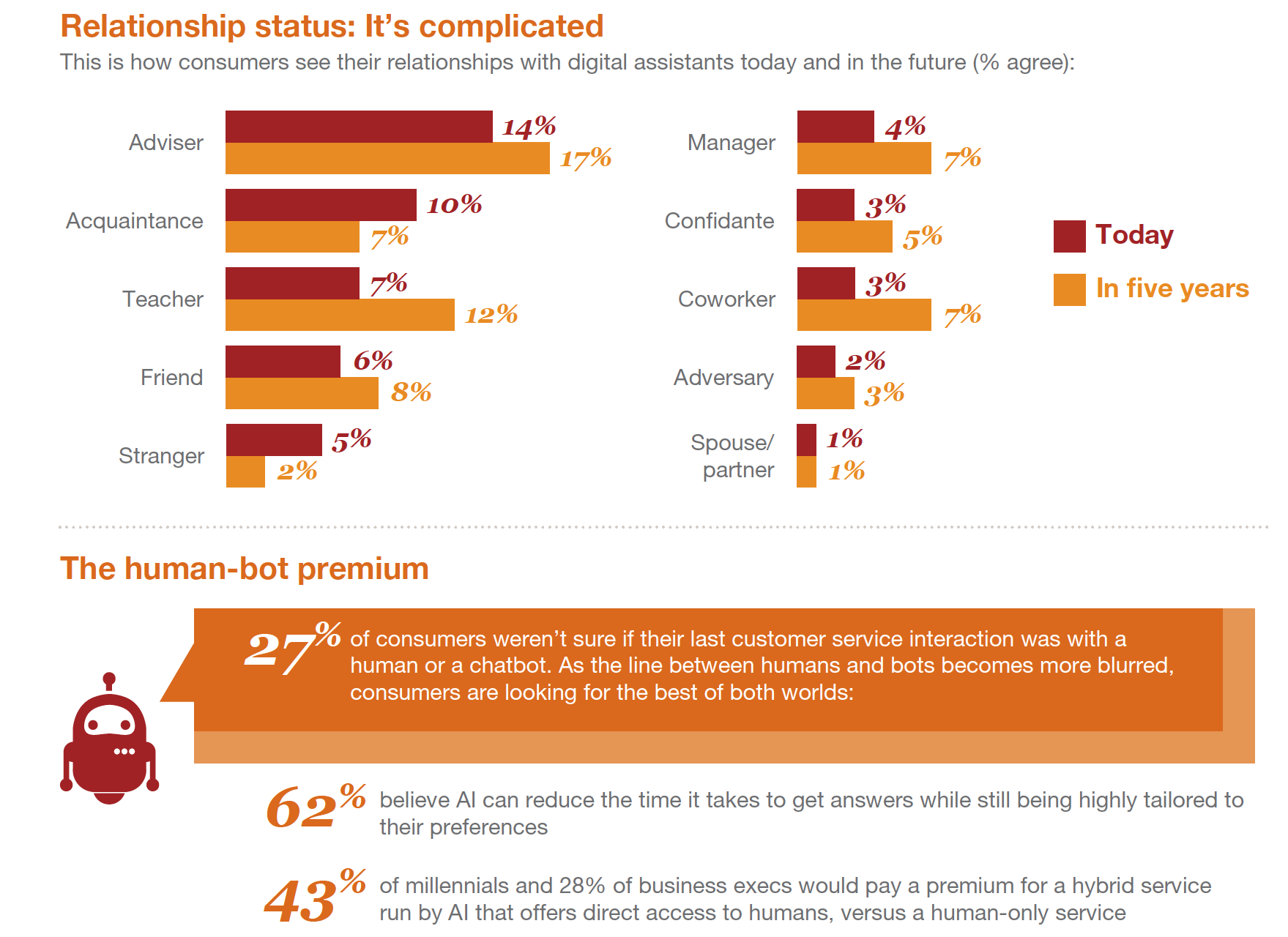A Consumer Intelligence report by PwC revealed that most consumers believe artificial intelligence (AI) will help humankind. In February 2017, PwC conducted an expert salon in New York City to capture ideas from thought leaders in AI and emerging technologies across media, entertainment, communications, and consulting.
More than half of the 2,500 individuals surveyed agree AI will help solve complex problems that plague modern societies (63 percent) and help people live more fulfilling lives (59 percent). On the other hand, less than half believe AI will harm people by taking away jobs (46 percent). When it comes to a blockbuster-movie-style doomsday, only 23 percent believe AI will have serious, negative implications.
The survey was conducted among adults 18 and older. Business decision makers were identified as being managers or leaders within their organisations who influenced key choices on technology, service development, and other critical aspects of developing the business.
Forms of AI in use today include digital assistants, chatbots, and machine learning. With a market projected to reach US$70 billion by 2020, AI is poised to have a transformative effect on consumer, enterprise, and government markets around the world, said the report.
Consumers are rooting for AI
Despite the way the film industry and news media largely portray AI, most consumers see how it could benefit their lives.
At PwC’s panel discussion with AI thought leaders, Kaza Razat, an AI developer, theorised that AI will help humans overcome their own shortcomings: “As humans, there’s a lot we’re not good at. When we’re making machines that are better at certain things than we are, it’s still an extension of us. From an evolution standpoint, there are places where we’ve reached the end of our capacity.”
Most consumers believe that AI will provide solutions to major issues they’re concerned with today. Cybersecurity, privacy, cancer, and other diseases rank among their chief concerns. For instance, with the enormous amount of DNA data being recorded today, AI could revolutionise personalised healthcare by analysing that data; wearables and ingestibles could monitor and correct human behaviour to maximize life expectancy and enhance wellbeing.
But what do consumers think about AI’s impact on their immediate future? In the next five years, more than half can imagine AI assistants replacing humans as tutors (58 percent), travel agents (56 percent), tax preparers (54 percent), and office assistants (52 percent). However, consumers still have reservations about consciously adopting AI as home assistants, house cleaners, financial advisers, chauffeurs, health coaches, and doctors.
Over 40 percent of consumers also believe AI will expand access to financial, medical, legal, and transportation services to those with lower incomes. This democratisation has already been popping up with services like DoNotPay, a bot that appeals parking tickets for free.
However, the report found that 77 percent would prefer to visit a doctor in person than to take an assessment at home with a robotic smart kit. Sixty-one percent would rather have universities with human teaching assistants than universities with chatbot assistants that lower the cost of tuition. It seems like consumers still crave human insight and connection when it comes to more long-term or impactful decisions on their health and education.
People love their Digital Assistants
AI programs that can help individuals perform tasks or services, called digital assistants, have already become common and acceptable shoulders to lean on in daily life and work environments. Forty-two percent of consumers already use digital assistants, while 72 percent of business execs and 53 percent of millennials are using them. Combining user input, location awareness, and other information across a variety of online sources, they’re shedding any negative perception of being just frivolous apps, said the report.
But as the line between humans and bots becomes more blurred, so too do consumer preferences for customer service. Thirty-five percent said their biggest concern with an AI customer service was a loss of human touch. They’re looking for the best of both worlds. In fact, 43 percent of millennials and 28 percent of business execs would pay a premium for a hybrid service run by AI that offers direct access to humans, versus a human-only service.
Businesses investing in AI
Businesses are betting big on AI: 54 percent of business and IT executives in PwC’s Digital IQ survey said their companies are making substantial investments today; in three years, that number should jump to 63 percent.
In their own roles, business execs see huge potential for AI to alleviate repetitive, menial tasks such as paperwork (82 percent), scheduling (79 percent), and timesheets (78 percent). In fact, 78 percent agree it will free all employees from such tasks at all levels across their organisations. Already, 34 percent of business execs say that the extra time freed up from using digital assistants allows them to focus on deep thinking and creating.
“In the last few decades, we as mankind have made our systems much more complex. As a result, no one person can cumulatively know what is involved in any given system or solution. Our machines are becoming smarter by learning and embodying the collective experience of mankind, or a group of experts.” – Anand Rao, Innovation Lead, Data & Analytics, PwC“In the last few decades, we as mankind have made our systems much more complex. As a result, no one person can cumulatively know what is involved in any given system or solution. Our machines are becoming smarter by learning and embodying the collective experience of mankind, or a group of experts.”
– Anand Rao, Innovation Lead, Data & Analytics, PwC
Seventy-two percent of business execs believe AI will be the business advantage of the future. More than half believe that utilising AI in business settings could boost productivity, inform business strategy, and generate growth which far outweighs the potential downside of employment concerns, the report noted.
The post Customers Welcome Artificial Intelligence appeared first on Fintech Schweiz Digital Finance News - FintechNewsCH.




Comments